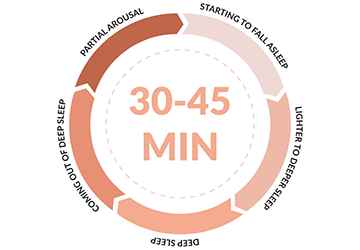Parents must understand their baby's sleep patterns as they directly impact their well-being and the entire family. Babies go through different sleep stages. Understanding these patterns can help parents establish healthy sleep habits, improve sleep quality, and promote overall development. Here's a comprehensive guide to what every parent should know about baby sleep patterns:

1. Newborn Sleep Cycle:
Newborns typically have short sleep cycles, ranging from 2 to 4 hours. Your sleep is divided into active (REM) and quiet (non-REM) sleep. Babies may twitch, make small noises, and even smile during active sleep, whereas undisturbed sleep is characterized by deep, peaceful rest.
2. Irregular Sleeping Hours:
In the first few weeks, babies have no precise daily rhythm. They can go to sleep at any time, making it difficult for parents to set predictable sleep habits. However, this irregularity is a normal part of early development.
3. Sleep Regression:
Parents should be aware of sleep regressions when a baby's sleep cycle may be temporarily disrupted. Typical regression stages occur at approximately 4, 8-10, and 18 months. These stages are often associated with developmental milestones and adjustments.
4. Establish a Bedtime Routine:
Establishing a consistent bedtime routine is crucial to help babies recognize sleep cues. Activities such as a warm bath, gentle rocking, or reading a bedtime story can signal your baby that it's time to wind down. Consistency is crucial when establishing these routines.
5. Safe Sleeping Habits:
Parents should prioritize safe sleep practices to reduce the risk of Sudden Infant Death Syndrome (SIDS); this includes placing babies to sleep on their backs, using a firm mattress, and keeping the sleep environment free of loose bedding and stuffed animals.
6. Night Care and Feeding:
Babies often wake up during the night, especially in the first few months. Frequent feedings are a natural part of a baby's growth and development. Parents must respond to their baby's hunger signals and provide him with food when necessary.
7. Transition to Longer Sleep Periods:
Babies gradually begin to sleep for more extended nights as they grow. Around the third to sixth month, some babies may start resting for five to six hours at a time. This transition varies from baby to baby, and parents should be patient and responsive to their child's needs.
8. Nap Mode:
It's also important to understand your baby's nap patterns. Newborns can take multiple short naps throughout the day, but they cluster them into more concise, extended periods as they age. Establishing a consistent nap routine can help improve your night's sleep.

9. Teething and Discomfort:
Teething can disrupt sleep patterns as babies may experience discomfort and pain. Parents should watch for signs of teething and use soothing measures such as teething rings or gentle massage to ease discomfort.
10. Create a Comfortable Sleeping Environment:
Ensure your baby's sleep environment is conducive to rest; this includes maintaining a comfortable room temperature, using soft, breathable bedding, and minimizing distractions. Some babies may prefer a white noise machine to drown out background noise.
11. Understand Sleep Associations:
Babies often form sleep associations, linking specific actions or objects with falling asleep. While this is normal, parents should be careful not to create potentially destructive associations, such as needing to be rocked to sleep every time.
12. Seek Professional Advice:
If parents are concerned about ongoing sleep problems, it is recommended that they seek the advice of a paediatrician or sleep specialist. It is essential to rule out any underlying medical issues and seek advice on developing an appropriate sleep strategy.
13. Deal With Lack of Sleep:
Recognize that sleep deprivation is a common challenge for new parents. Both parents must share responsibilities and take breaks when necessary. Proper self-care supports a more positive and patient parenting style.
In summary, understanding infant sleep patterns is a dynamic and evolving process that requires patience and adaptability. Every baby is unique, and what works for one may not work for another. By adjusting to the baby's cues, establishing consistent routines, and seeking professional advice, parents can manage the complexities of the baby's sleep patterns to create a healthier sleep environment for the baby and the entire family.



